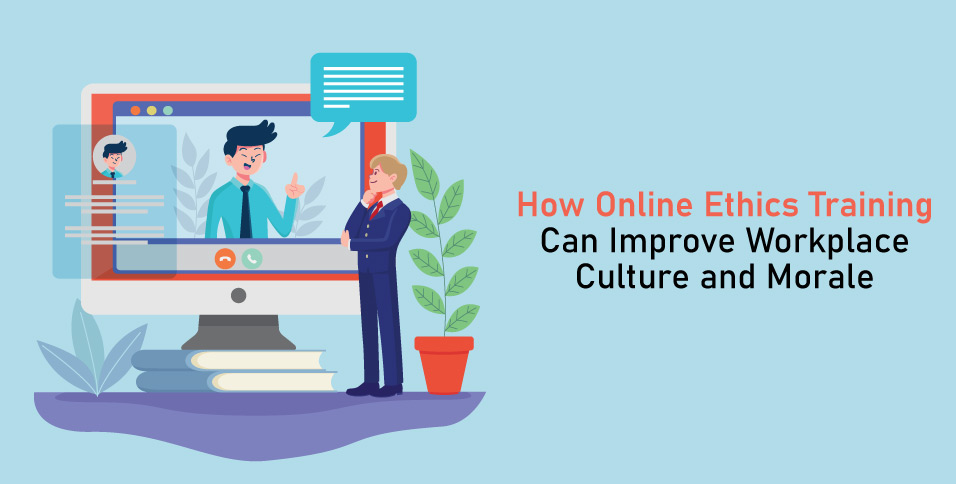In today’s ever-growing competitive world, businesses aim to attain an ethical workplace culture that promotes honesty, integrity, and accountability. A workplace culture built around strong, ethical principles provides a sense of structure for employees to follow so they can make the best decisions aligned with their company values.
An organization that prioritizes ethics in its operations is more likely to retain valued employees, boost employee engagement levels, improve organizational reputation, and create a sustainable future for itself. As such, it is imperative that every organization invests in regular online ethics training as part of its strategy to nurture a positive work environment.
This blog examines how online ethics training enables organizations to promote an ethos of responsibility within the workforce by imparting basic principles and practicing good conduct while ensuring compliance with industry regulations.
Why Should Companies Prioritize Ethics Training?
Ethics training fulfills several functions:
- It raises awareness – Employees learn about laws governing their industries or sectors along with relevant rules applicable across all fields.
- It empowers individuals – Staff members are given skills required to handle conflicts arising from ethical dilemmas in various environments.
- It improves company image – Ethical businesses enjoy enhanced reputations not only amongst stakeholders but also clients.
- Demonstrates good leadership: Leaders setting high standards for themselves inspire their team to follow similar paths, generating loyalty towards the brand.
Benefits of Online Ethics Training
Online learning has become popular over time because it offers a compelling instructional experience as compared to traditional classroom delivery mode. The benefits associated with embracing this approach likewise extend beyond just cost savings and convenience.
Customization
One significant advantage of online learning programs is they can be easily customized based on individual business needs, including tailored course modules specific to department goals, streamlined orientation videos unique to the job classification, etc.
Consistent Delivery
Instructor-led sessions come at a great logistical expense as off-site locations need organizing and hiring trainers capable enough to provide courses either to individual groups or the entire company staff. In contrast, online ethics training courses offer uniform delivery across the organization that ensures every employee receives equal opportunities for learning.
Cost-Effective
The expense of organizing traditional instructor-led sessions is significantly higher than e-learning, leading to decreased spending on logistics like travel expenses and hiring fees. It’s easier to allocate the budget as per enrollees’ volume and ensure time spent scheduling events is put to productive use.
Improved Employee Performance
Employees who have undergone thorough online ethics training courses are better equipped to identify potential ethical issues facing their firm. This ability not only enhances their credibility among colleagues but also instills confidence in customers, who may test their integrity, knowing that they are well-versed in best practices within their sector. This improved perception of their ability to handle relevant task responsibilities begins to permeate through entire teams, resulting in better overall outcomes.
Creating a Strong Workplace Culture
Workplace culture plays a significant role in determining elements such as productivity, profitability, and long-term sustainability. By incorporating ethical practices learned from comprehensive training programs, organizations can foster positive attitudes towards work. This, in turn, encourages camaraderie among peers, nurtures leadership skills, and fosters transparent communication channels among departments. This approach makes it easier to navigate potential conflict situations and contributes to a stronger overall workplace culture.
Integrating workplace ethics into operations through these initiatives fosters greater respect and cultivates an admirable corporate image among staff members. This demonstrates the organization’s commitment to upholding core values ingrained within its organizational framework.
Empowering Employees with Tools to Handle Ethical Challenges
Employees need relevant skill sets to effectively tackle complex ethical challenges. Providing proper guidance equips them to handle tough choices with clarity and confidence, preventing ambiguity that can lead to unsatisfactory results. Online ethics courses offer ample preparation for workers to navigate roadblocks through tailored modules. This provides a solid foundation upon which everyday conversations can be centered, empowering employees to take control and make informed decisions moving forward.
Conclusion
The implementation of online ethics training leads to tangible and positive changes that ultimately enhance organizational success. E-Learning stands out as a preferred training modality due to the following advantages:
- Consistent Delivery: Online ethics training ensures consistent delivery of course material across large organizational ecosystems, minimizing variations in content understanding.
- Flexibility and Updates: The ability to frequently revise content allows for flexible updates as regulations and best practices evolve, ensuring that training remains current and relevant.
- Individualized Completion: Quick course turnaround times enable employees to complete training according to their individual schedules, accommodating various workloads and commitments.
Organizations aiming to enhance workplace culture and cultivate a positive public brand image should consider integrating online ethics courses into their operations. This integration fosters loyalty among team members and has a positive impact on employee-customer interactions, subsequently boosting overall productivity and profitability. As businesses strive for competitive differentiation in a rapidly evolving landscape, imparting relevant skill sets via e-learning becomes a strategic asset for driving company growth.
Investing time and resources into Online Ethics Training elevates an organization’s commitment to social responsibility and adherence to industry standards. This proactive approach helps in minimizing compliance violations while fostering the creation of robust, healthy internal work environments. These factors are critical for achieving financial sustainability and ensuring corporate longevity.
Also Read: How to Identify Risks in the Workplace















